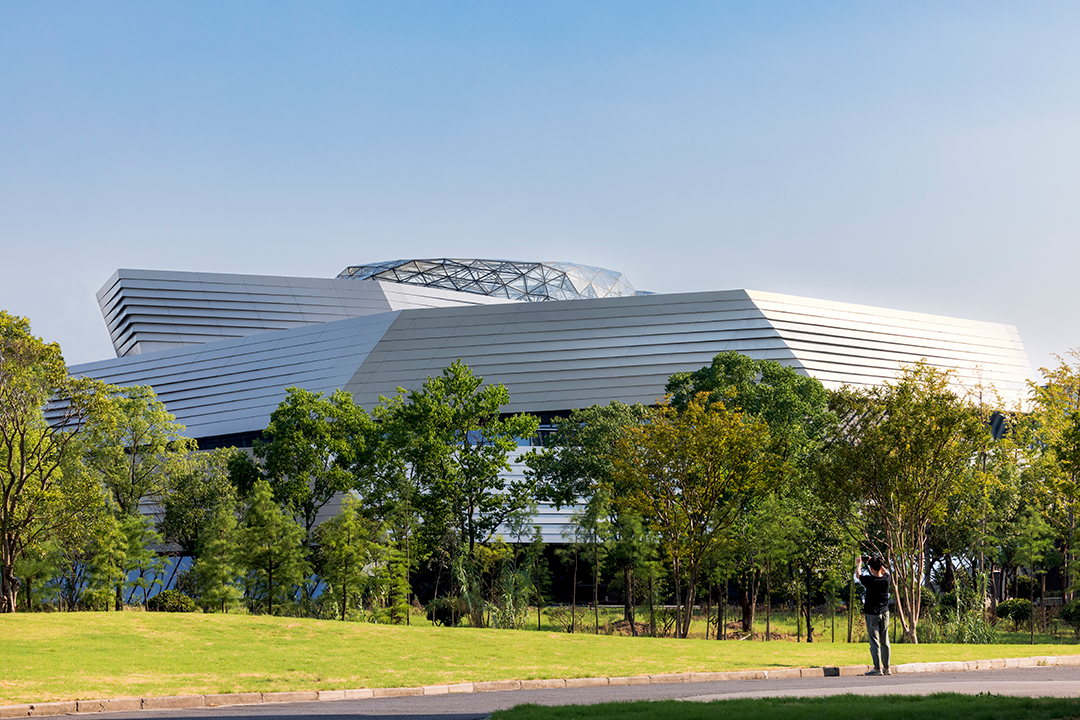

设计单位 CROX阔合
项目地点 浙江嘉兴
建成时间 2024年2月
建筑面积 10300平方米
本文文字由CROX阔合提供。
概况/General situation
云艺术中心,坐落于嘉兴百步开发区核心区域,云馆艺术中心未来将开放给公众使用,形成集合产业文化、设计交流和艺术策展的创意中心。在中国设计产业艺术中心,如何有效利用工业土地,延续当地文眿,建立起建筑与环境共生的关系,是一个重要的课题。
The Cloud Center, nestled within the core of Jiaxing Baibu Development Zone, is on the cusp of becoming a public creative nucleus that converges industrial culture, design exchange, and art curation. In the context of China's Design Industry Art Center, a paramount challenge lies in adeptly repurposing erstwhile industrial land while safeguarding local cultural legacies, ultimately culminating in an architectural harmony with its surroundings.
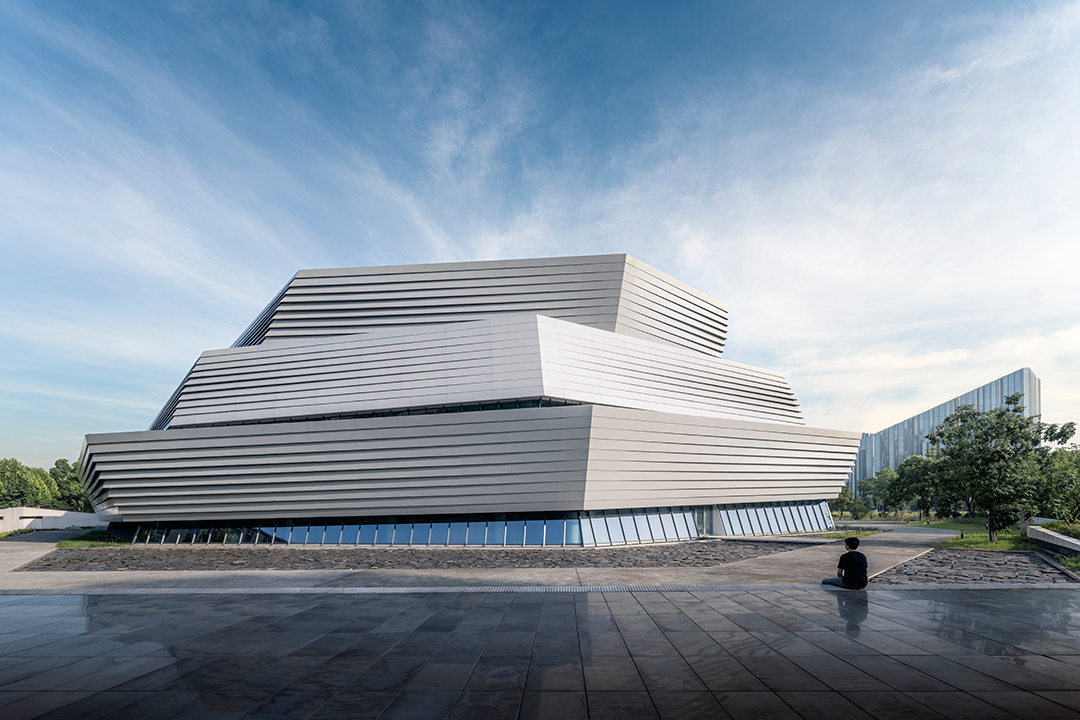

聚落/General situation
设计理念延续整体园区规划理念,将传统江南水乡特色的小桥流水,转换为南北贯穿的动线系统,与周围自然环境相连接,在园区北面生产基地,释放出地面层的机能使用,在二层建构出一种开放且连续的游园动线。
The design narrative adheres to the overarching thematic principles of the entire park, reinterpreting the classic elements of Jiangnan water towns—bridges and flowing water—into a vibrant north-south circulation system that blends harmoniously with its natural surroundings. Strategically, at the northern manufacturing base within the park, ground-level functions are effectively integrated while an uninterrupted and expansive visitor experience is meticulously designed on the second level.
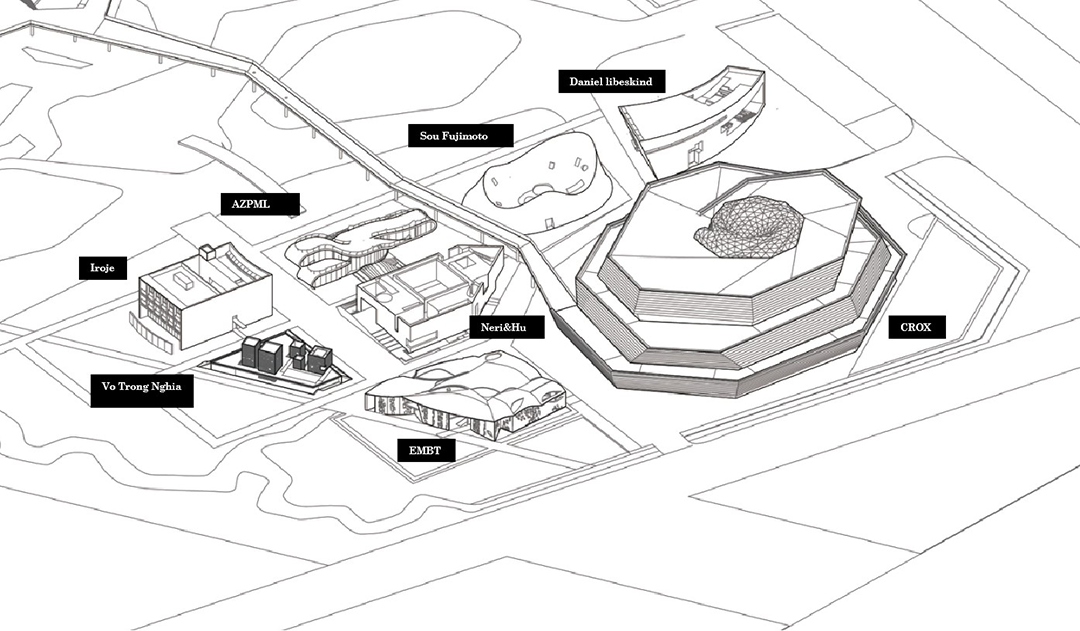
设计打破常规方正的工业厂区建筑表面,在园区南侧末端的路径端点,构成了艺术核心,一座南北贯穿、回转上升的天桥化身成的“八面体”,连结七家国际建筑事务所协力完成新的设计聚落,未来汇聚公众力量形成了一股能量场域。
Departing from the conventional rectilinear forms typical of industrial architecture, the southern end of the park's pathway culminates in an artistic centerpiece. This takes the form of an "octahedron" soaring and twisting through the air, serving as a pedestrian bridge. This distinctive structure acts as a unifying thread, bringing together seven international architectural firms who collaborated to forge a new cluster of designs. In the future, this space is poised to harness public energy, evolving into a potent sphere of influence and interaction, echoing the ethos of global architectural discourse.
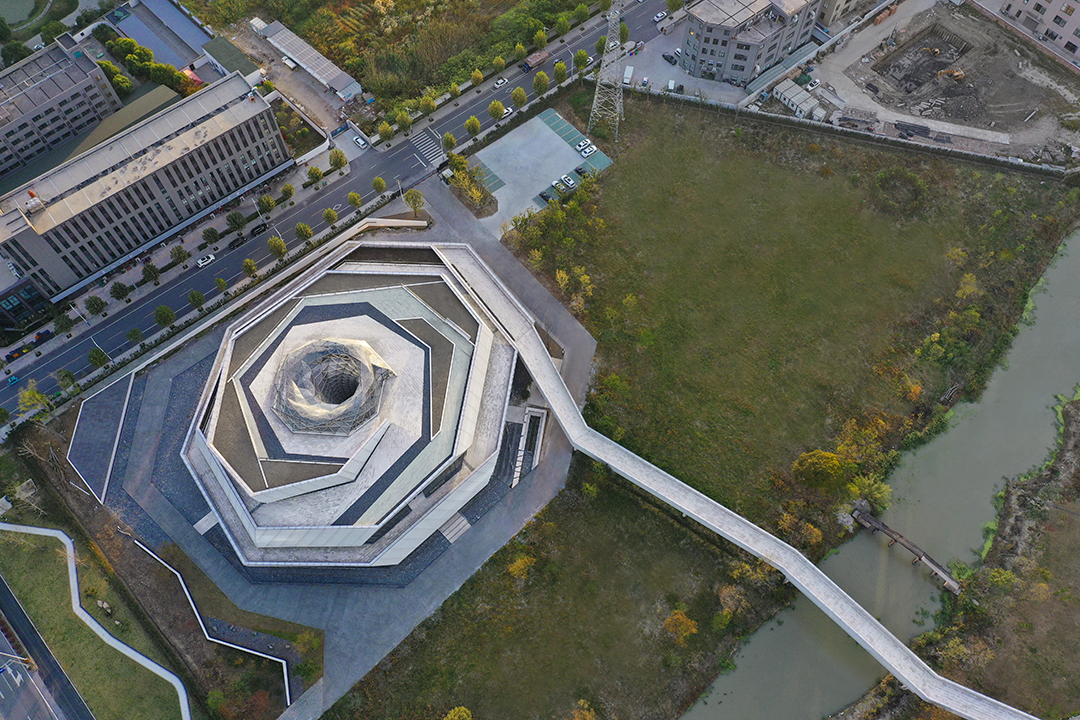
设计聚落由林琮然(中国台湾)协同七家国际知名的建筑设计事务所,联合里伯斯金(美国),娜德塔·塔格利亚布(西班牙),藤本壮介(日本),亚历杭德罗·札拉波罗(西班牙),承孝相(韩国),武重义(越南),郭锡恩和胡如珊(中国上海)共同打造。
The design cluster is orchestrated by C.R LIN( Taiwan,China) in collaboration with seven internationally renowned architectural firms, including Daniel Libeskind (USA), Benedetta Tagliabue (Spain), Sou Fujimoto (Japan), Alejandro Zaera-Polo (Spain), Seung H-Sang (South Korea), Vo Trong Nghia (Vietnam), and Yung Ho Chang & Rossana Hu ( Shanghai, China). This collective effort brings together nine celebrated international architects to craft a unique architectural ensemble.

八卦/Trigrams
“太极生两仪,两仪生四象,四象演八卦”,“ 万有,万事,万物”皆莫能跳脱出纲纪群伦,故而,八卦有通彻天地之能,可谓之—大道之源。大道释然,莫言始终,周而复始,万象包罗八卦的精神也符合企业发展的精神。
In the philosophy of Chinese cosmology, the concept that Taiji spawns Yin and Yang, which in turn generate the Four Symbols, leading to the formation of the Eight Trigrams, signifies that all phenomena across existence, activities, and entities are fundamentally interconnected within a universal order and societal fabric. This idea posits the Eight Trigrams as embodying the essence of the primordial Great Dao, serving as its wellspring. The Great Dao's inherent principle is one of natural revelation, transcending temporal beginnings and endings, with an eternal cycle encapsulating myriad manifestations; this ethos aligns closely with the spirit of corporate evolution.

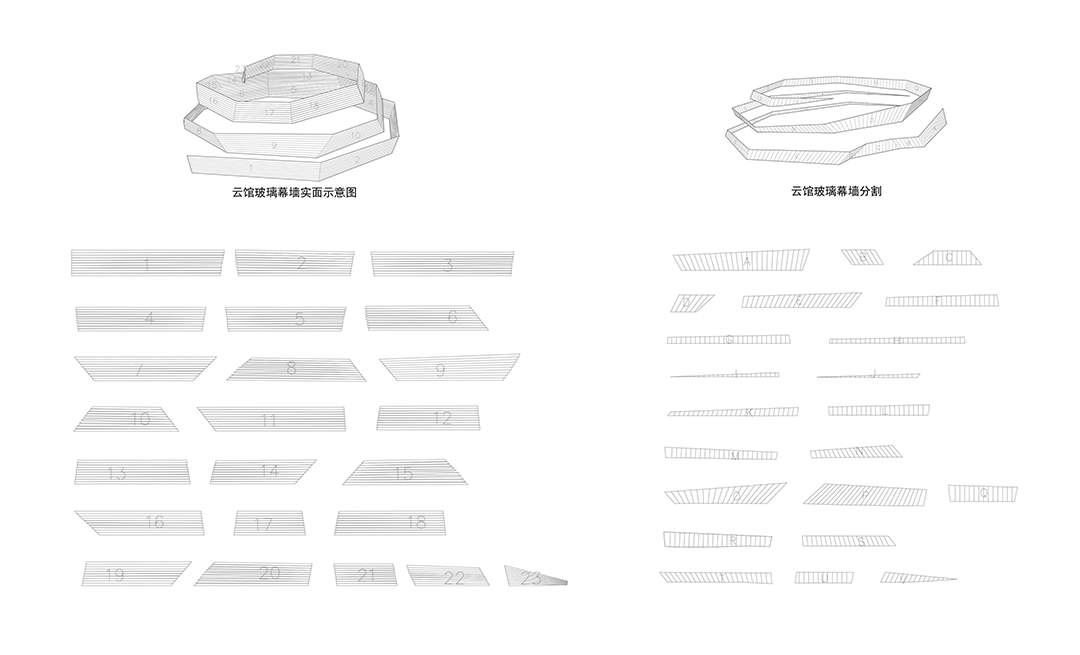


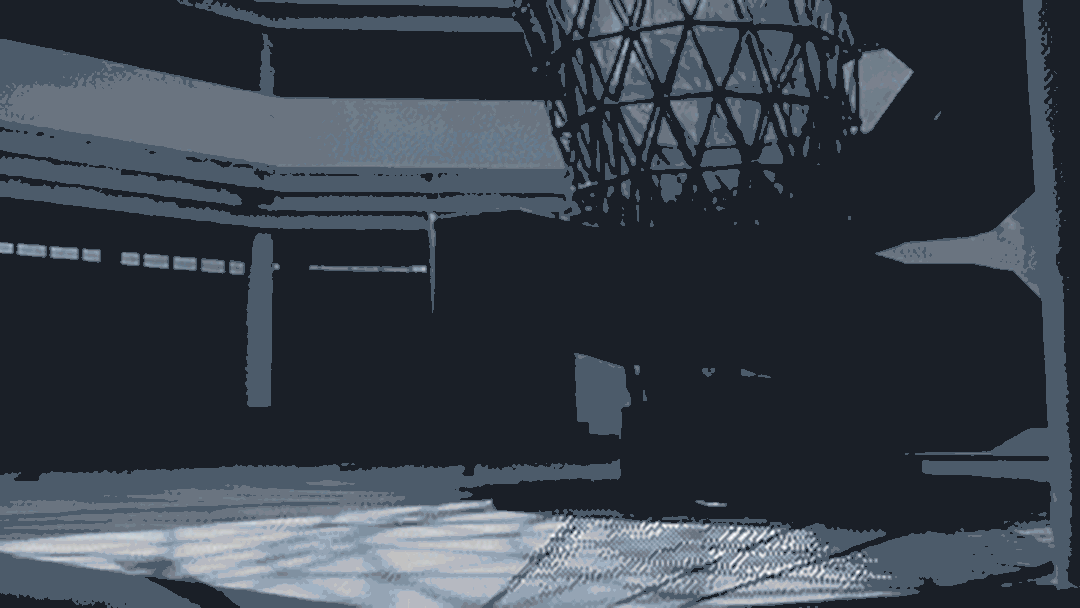
云馆艺术中心深受中国传统八卦哲学的影响,八卦象征阴阳平衡、生命循环以及万物变化无穷的规律。建筑本身的原型设计参照了八卦亭的概念,既保留了公共使用的传统属性,又展现出开放式的标志性,旨在连接全球设计能量,促进多元创新的发生。
The Cloud Center is profoundly influenced by traditional Chinese philosophy rooted in the symbolism of the Eight Trigrams, symbolizing equilibrium between Yin and Yang, the cyclical nature of life, and the ceaseless transformations inherent in all things. In approaching its architectural blueprint, the center adopts an international perspective akin to foreign architecture media narratives. Its design references the conceptual framework of an Eight Trigram pavilion, integrating the time-honored public function while also exuding a modern, open, and emblematic aesthetic. This innovative structure seeks to forge connections with global design forces, thereby nurturing a fertile ground for diverse and groundbreaking creative endeavors.

转山/Circuit
云馆建筑将人行动线相连交会于此,形成逐级退让的曲折坡道,建筑的表面由人的行动构成,以打破现代建筑单调与僵硬的方形,让逐步往上的路径构成了建筑的面貌,藉由不断转动而上,形成峰回路转,也是移步景异。三层平台在不同面向,各自保有打开的区域,供人们自由进入展厅内,漫步走上偌大的屋顶花园,在此处可一览整个园区,最后通过顶端的开口进入内部。人们顺着如同漩涡的造型柱体逐层往下,分别到达不同的楼层。内部布局逻辑,中央为垂直交通,四面八方的环形流线可抵达不同的功能,包含报告厅、党建展厅、企业博物馆、多功能艺术中心、设计师工作室等,人们可以沉浸到不同空间中,自由漫游、逛展,体验场景中的自在与独特性。
The center intertwines pedestrian circulation routes, culminating in a series of tiered, meandering ramps that defy the monotony and rigidity of modern box-like structures. The very fabric of the building's exterior is shaped by human movement, creating an ascending path that forms the architectural identity. As visitors ascend through a continually turning and undulating course, they encounter twists and turns akin to a journey where every step reveals a new vista.Three-tiered platforms at various orientations offer open areas inviting visitors to freely enter exhibition halls, eventually leading them to a spacious rooftop garden with panoramic views of the entire park. From here, they can access the interior via an opening at the top. Visitors are guided downward through a vortex-like column structure, descending to different levels where an internal layout logic is centered around vertical circulation. The ring-shaped flow from all directions connects to diverse functions such as auditoriums, Party-building exhibition spaces, corporate museums, multi-functional art centers, designer studios, and more. This arrangement encourages people to immerse themselves in distinct environments, free to roam, explore exhibitions, and experience the unique and liberating qualities of each space within the venue.
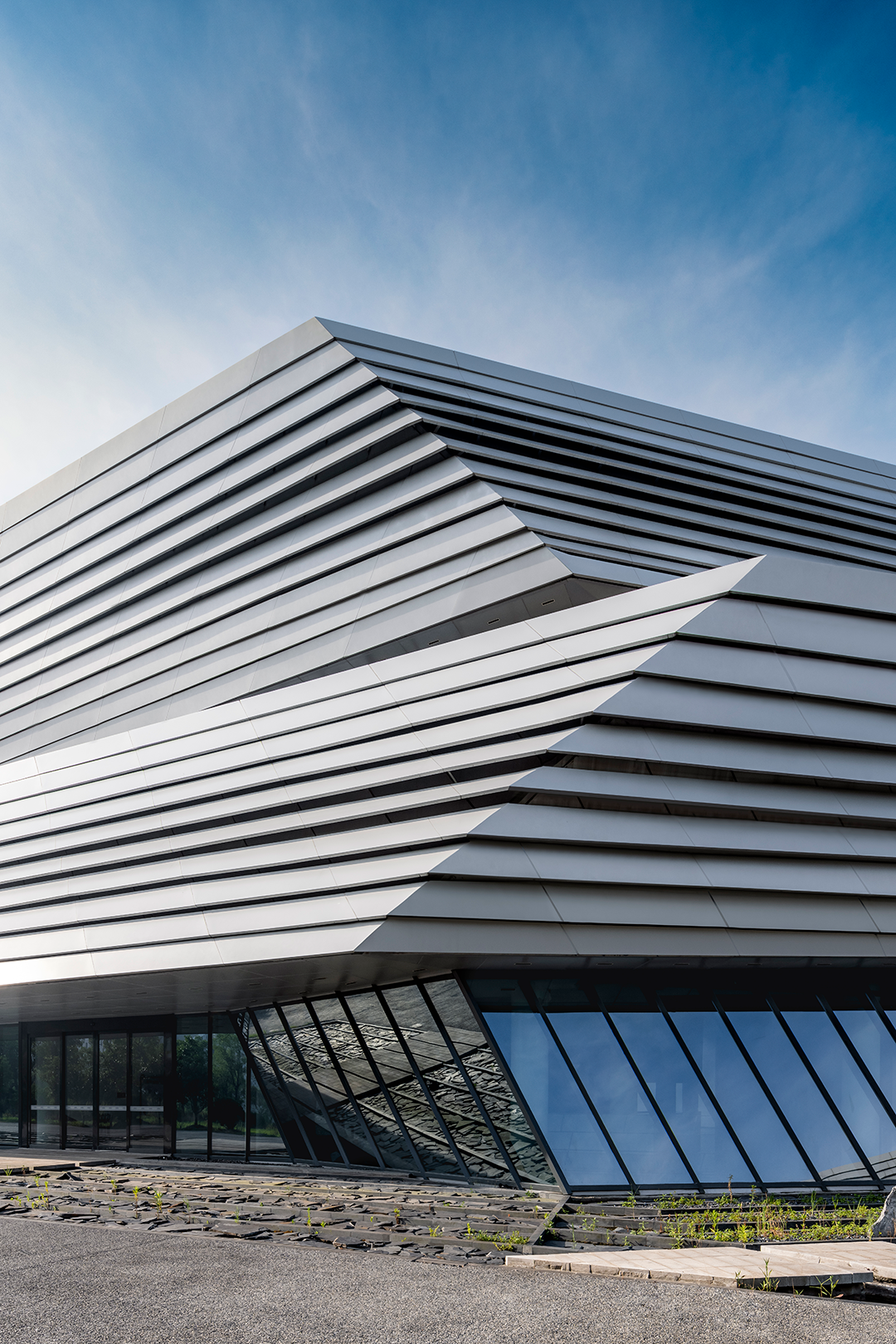
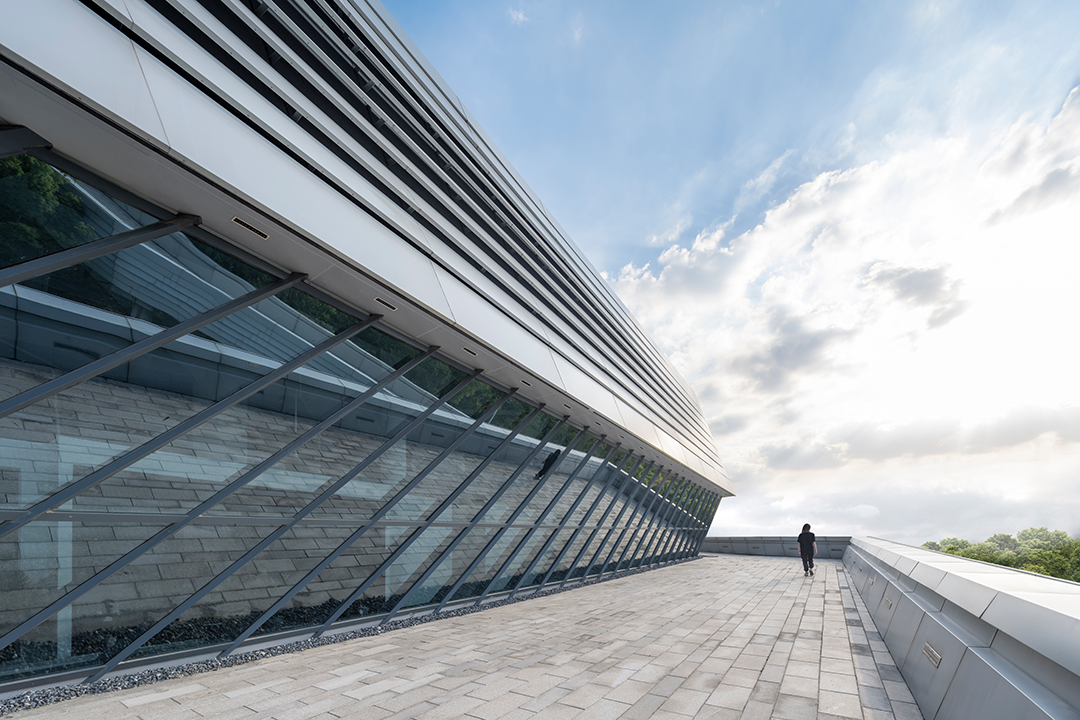
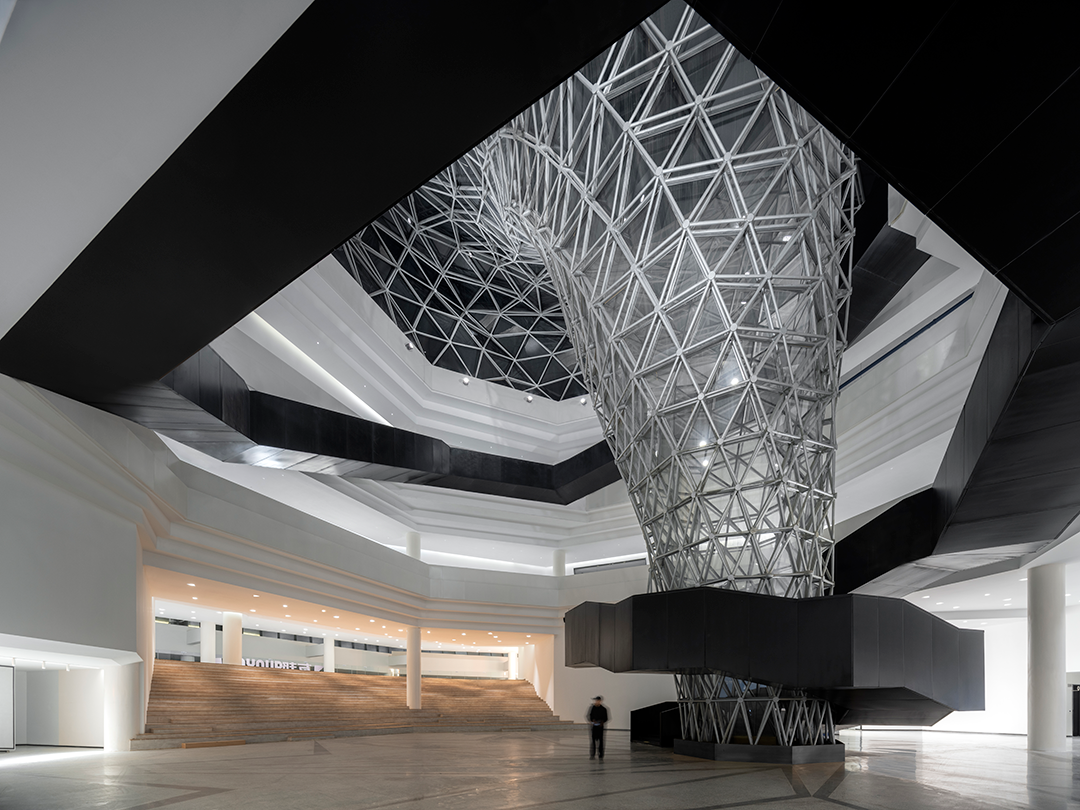
工料/Materials
建筑整体外观为转动的金属表皮,是由企业自主研发生产的铝板,预制切割弯折并自主施工,体现中国制造精工细作的文化。每一片折面上有着连续不断凹折线,形成的光影变化体现出灵动的艺术感受。
The overall architectural envelope features a dynamic metal skin that rotates, showcasing the craftsmanship and precision of Chinese manufacturing culture. This innovative aluminum cladding, developed and produced in-house by the enterprise, is pre-cut and intricately folded before being self-assembled on-site. Each facet boasts an unbroken series of undulating folds, casting ever-changing shadows that evoke a sense of fluidity and artistic dynamism.
户外花岗岩地面构成往上盘旋的通道,地面与外墙两者间形成缝隙,可以由外部引入漫射的光线,与建筑内部相连,创造展厅舒适参观体验。
The outdoor pathway spirals upwards, composed of weathering steel, which complements the building's exterior. A strategic gap between the ground surface and the outer wall allows diffuse natural light to filter through, seamlessly connecting the external environment with the interior spaces. This integration creates a comfortable exhibition experience within the gallery, harmonizing ambient lighting with the sophisticated built form.
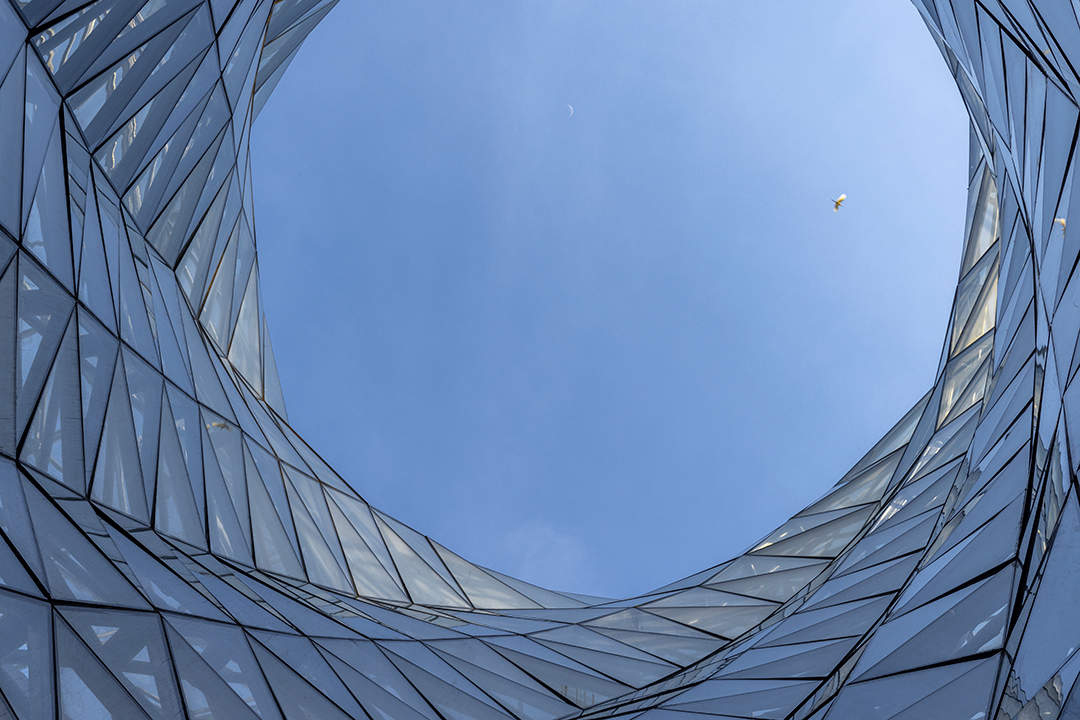
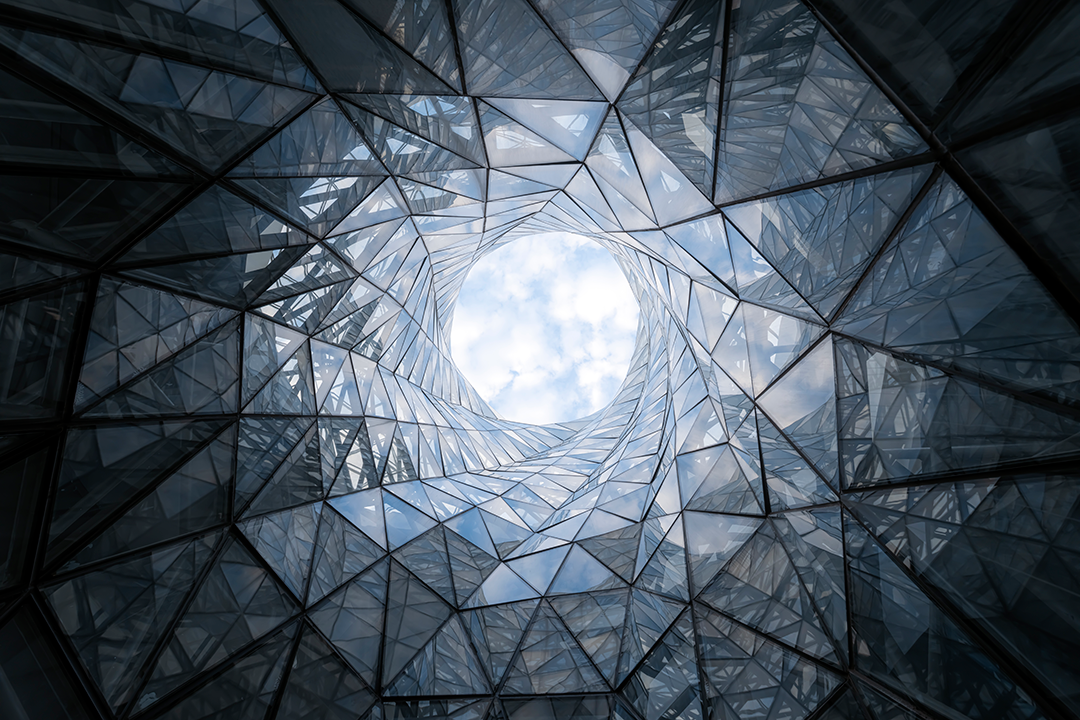
中央主中庭,由中空的玻璃结构体由外而内贯穿,表面上可供开合的玻璃窗兼具着通风与采光的功能。黑色旋转钢板楼梯以中央结构体支撑,连接一至三层楼面,每个楼面延续八卦的形态,切分成一层层的切面迎向天空。
At the heart of the structure lies a central atrium, characterized by an open-air glass construction that penetrates the building from its exterior to its core. The operable glazed windows on its surface serve dual purposes of ventilation and natural illumination. A black spiral steel staircase is cantilevered off the central structural element, linking all three levels in a continuous gesture echoing the form of the Eight Trigrams. Each floor plate is fragmented into facets that face upward towards the sky, akin to an unfolding geometric pattern.

天光顺阶洒下充满整个中庭,时刻透露出的光影变化,映射着下方的黑白拼花的水磨石、白墙与木阶梯,共同打造极具仪式感的天地剧场,外部刚硬的形象与内部温暖的光线,演绎着刚柔并济的东方建筑,建筑内部与外部环境融为一体。
The changing light from above cascades down the atrium, casting ever-evolving shadows throughout the day, reflecting upon the water-polished terrazzo with its black-and-white mosaic pattern, white walls, and wooden steps. This ensemble creates a dramatic, ceremonial space—a theater of earth and sky—where the juxtaposition of the robust external appearance and the soft, warm interior lighting embody the harmonious interplay between strength and gentleness inherent in Eastern architecture. The building's interior seamlessly merges with the external environment, crafting a holistic experience.
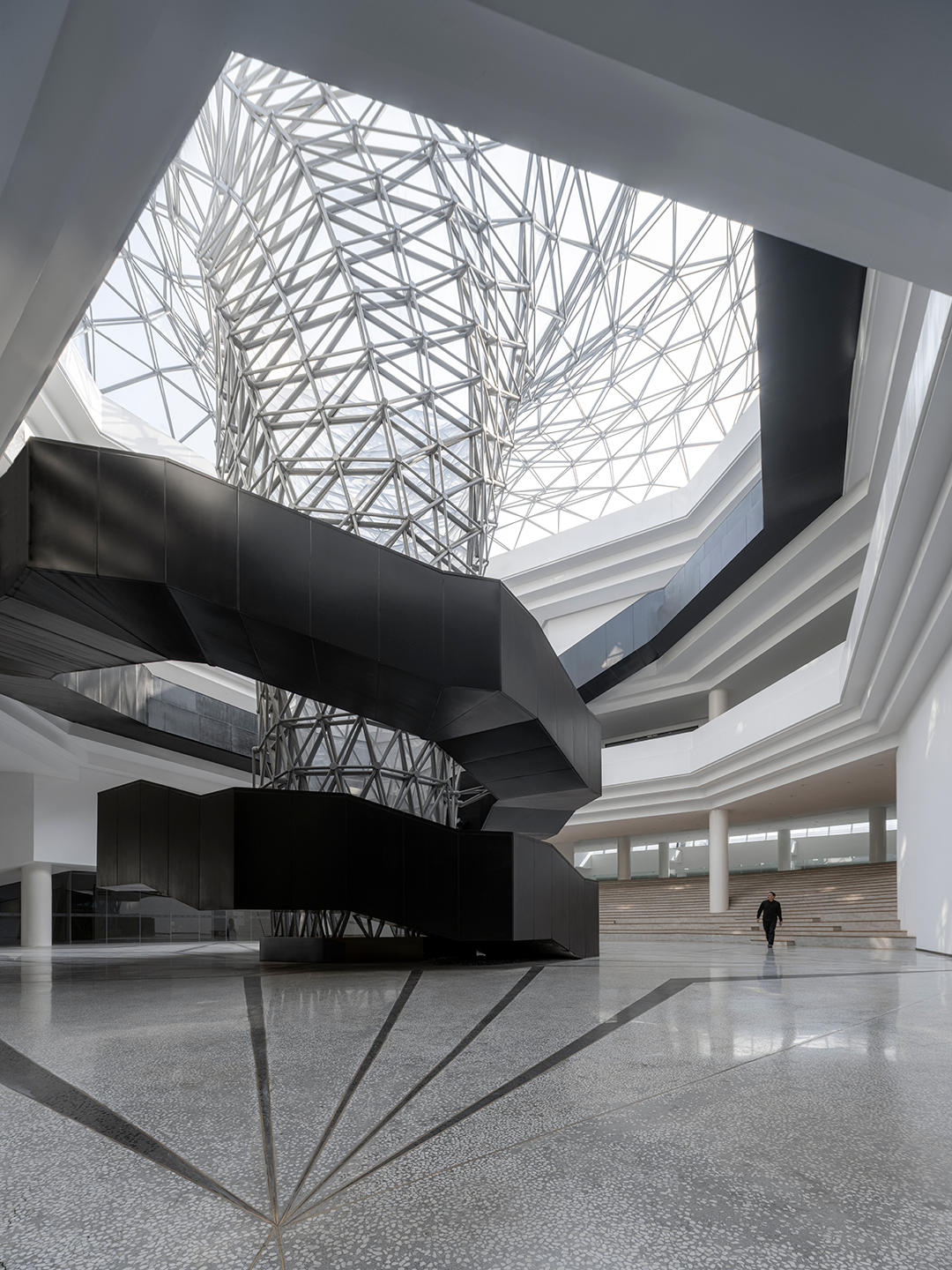



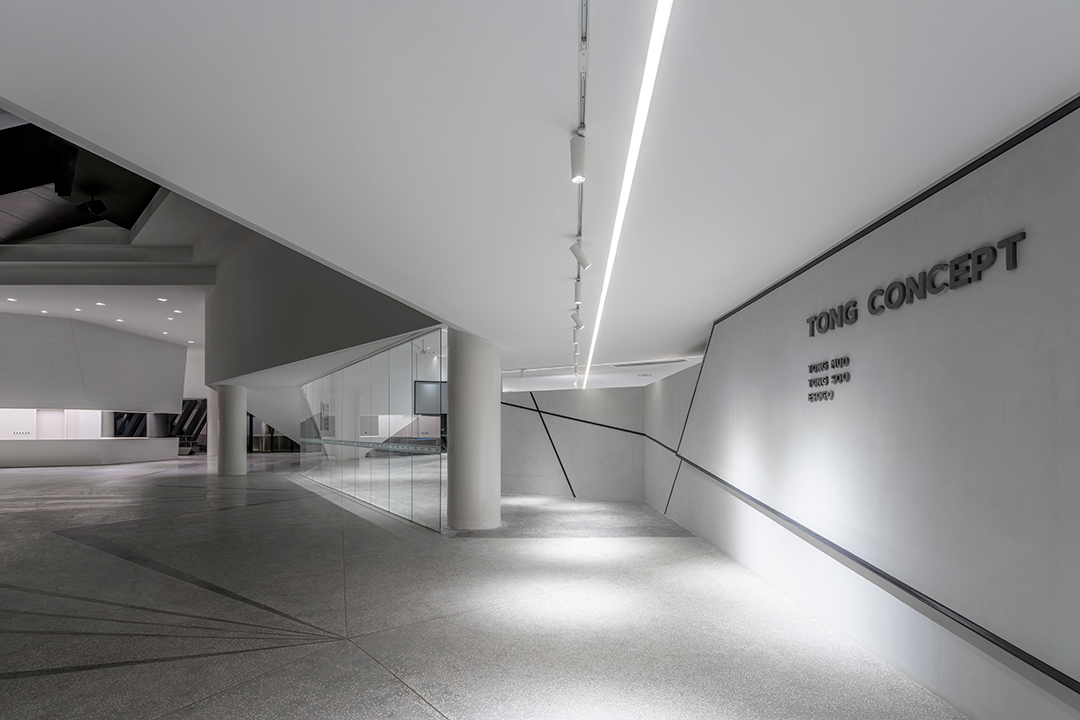


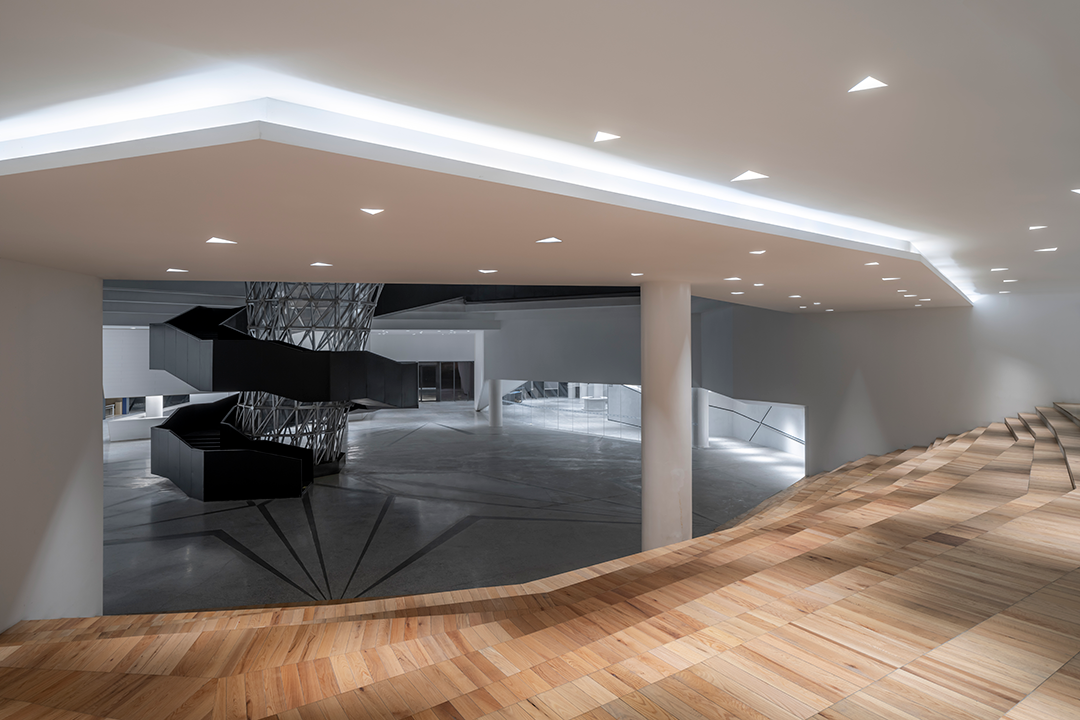
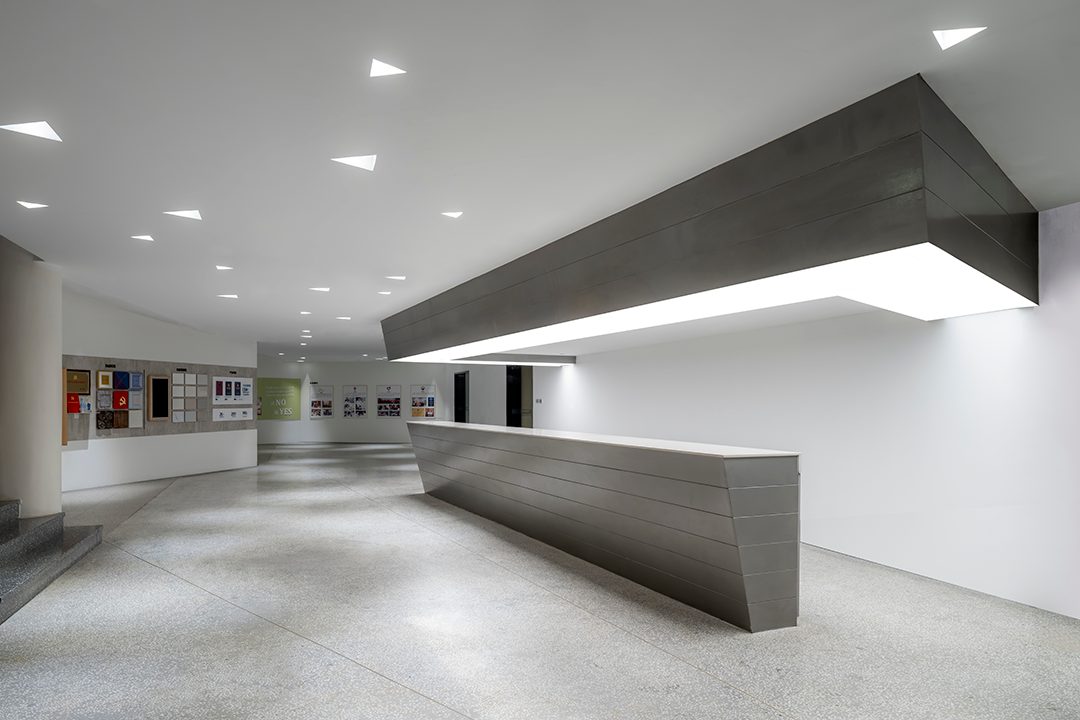
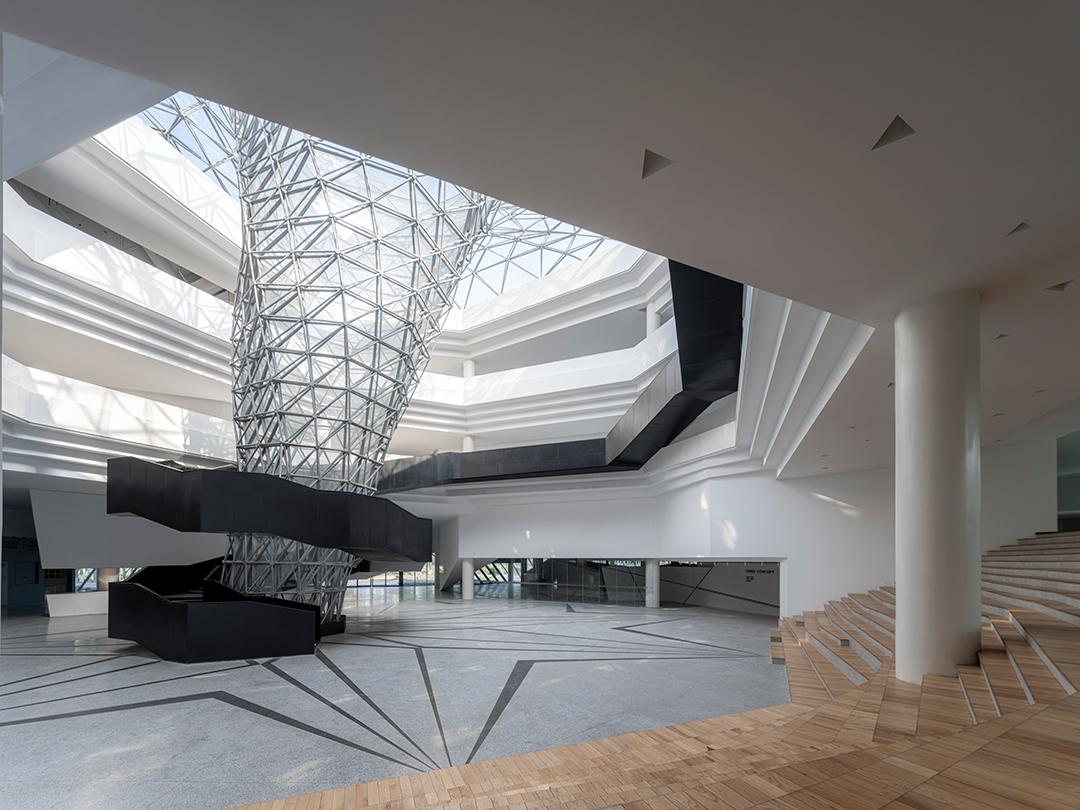
这座不断旋转的云馆仿佛是在江南土地上的一个八卦漩涡,强而有力地改变了整个开发区机械且单调的气氛。充满人性尺度的户外天桥引领人们通往建筑,让人们与周围的环境,建立更友善的关系。
This continuously twisting Cloud Pavilion acts as a metaphorical vortex of the Eight Trigrams, powerfully transforming the otherwise mechanistic and monotonous atmosphere of the development zone. The inviting human-scaled outdoor skywalk serves as a guidepost, leading people into the building while fostering a more amicable rapport between visitors and their surrounding environment.
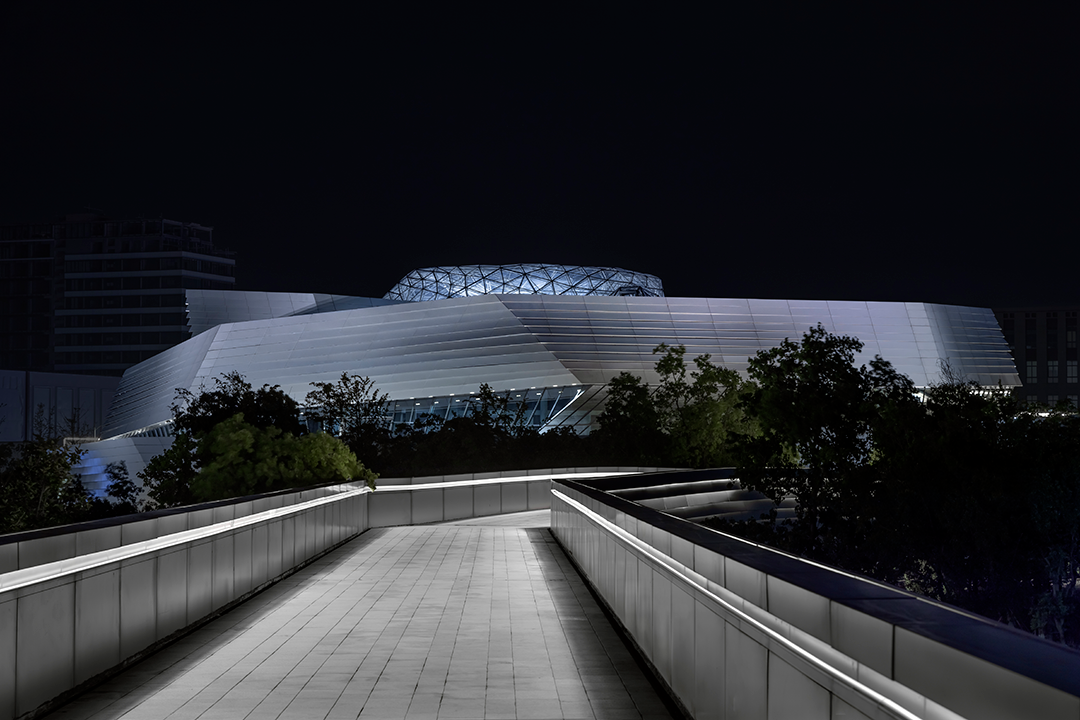
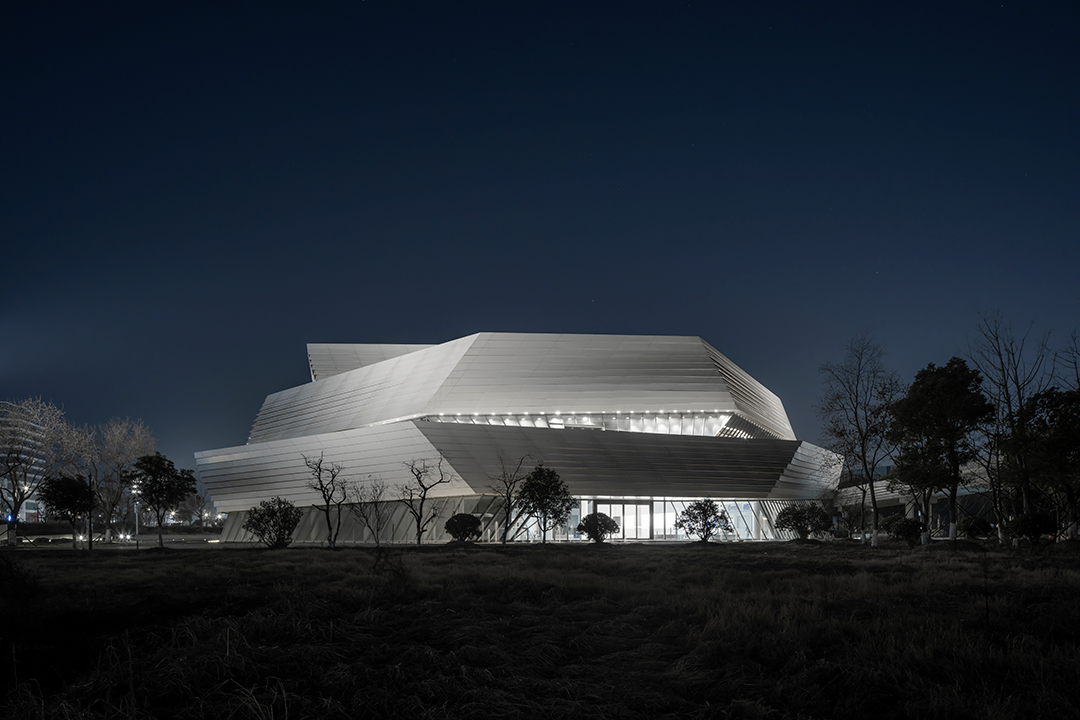

模型图片 ▽
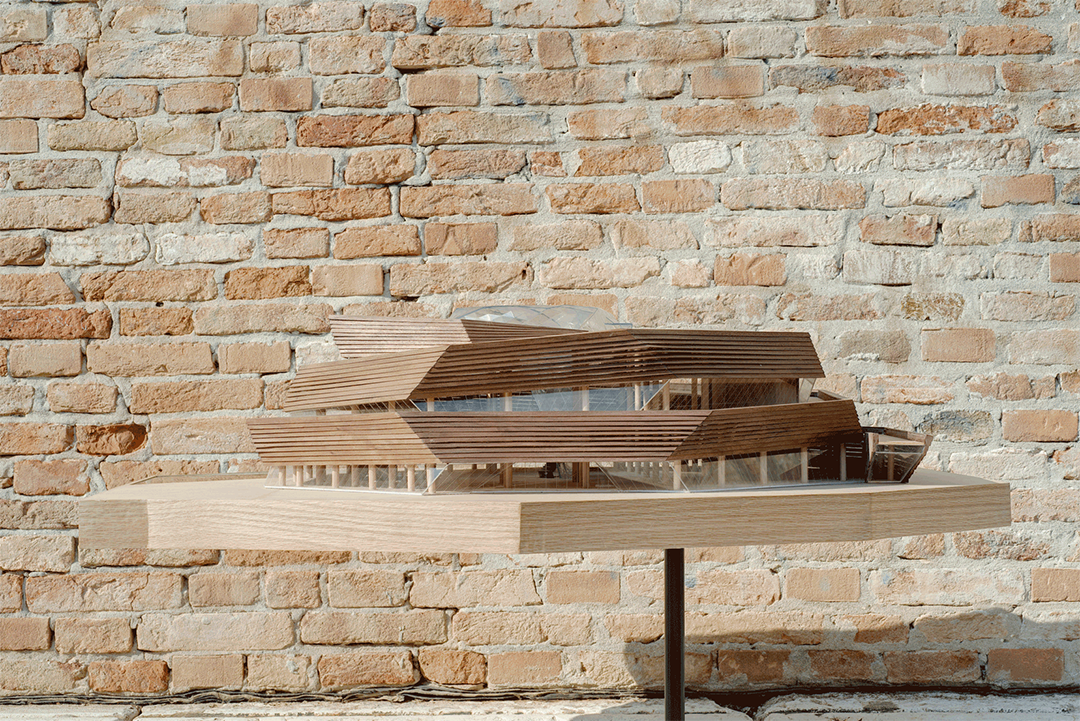

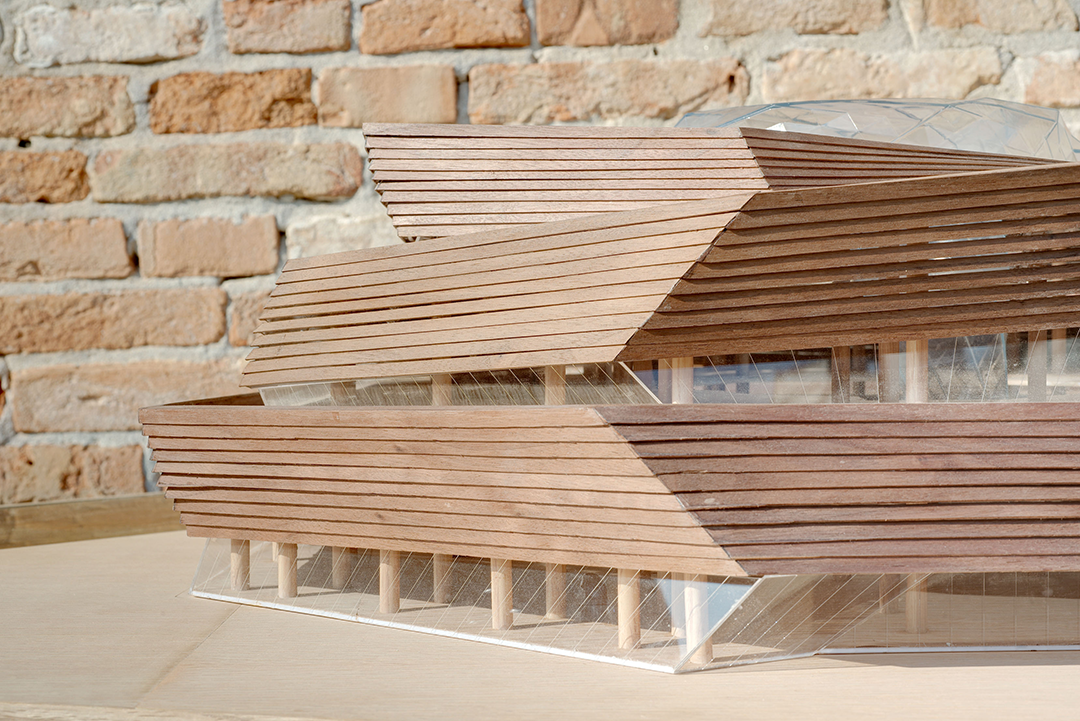
设计图纸 ▽

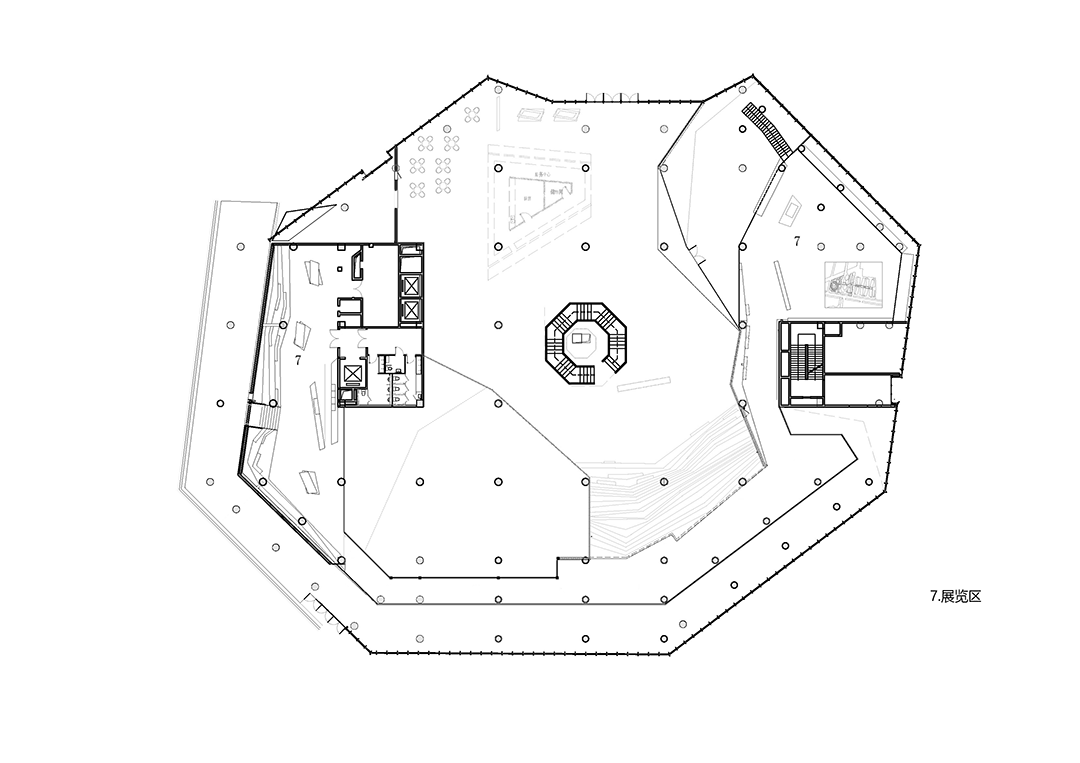

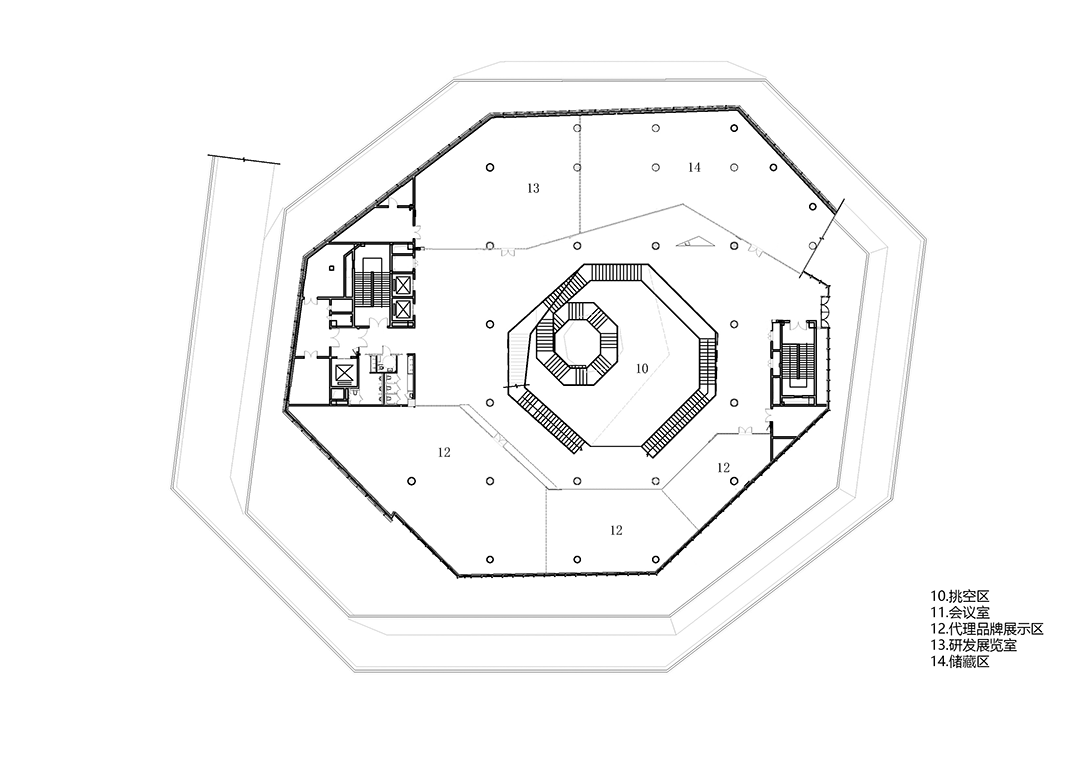
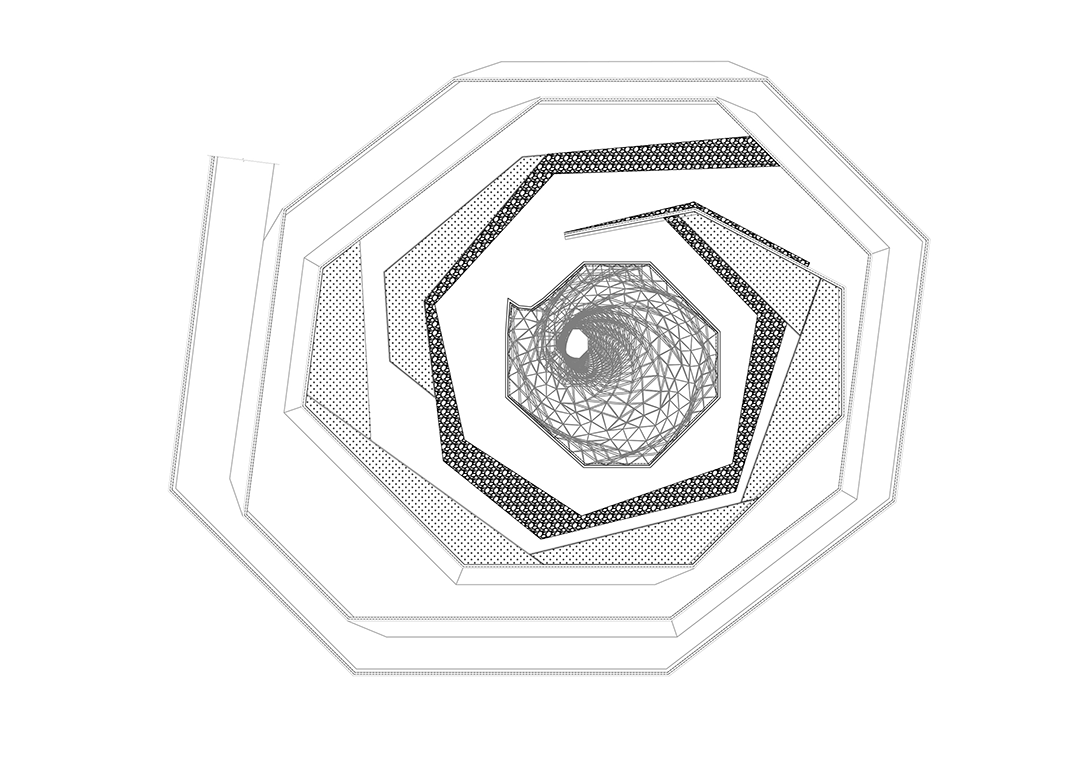






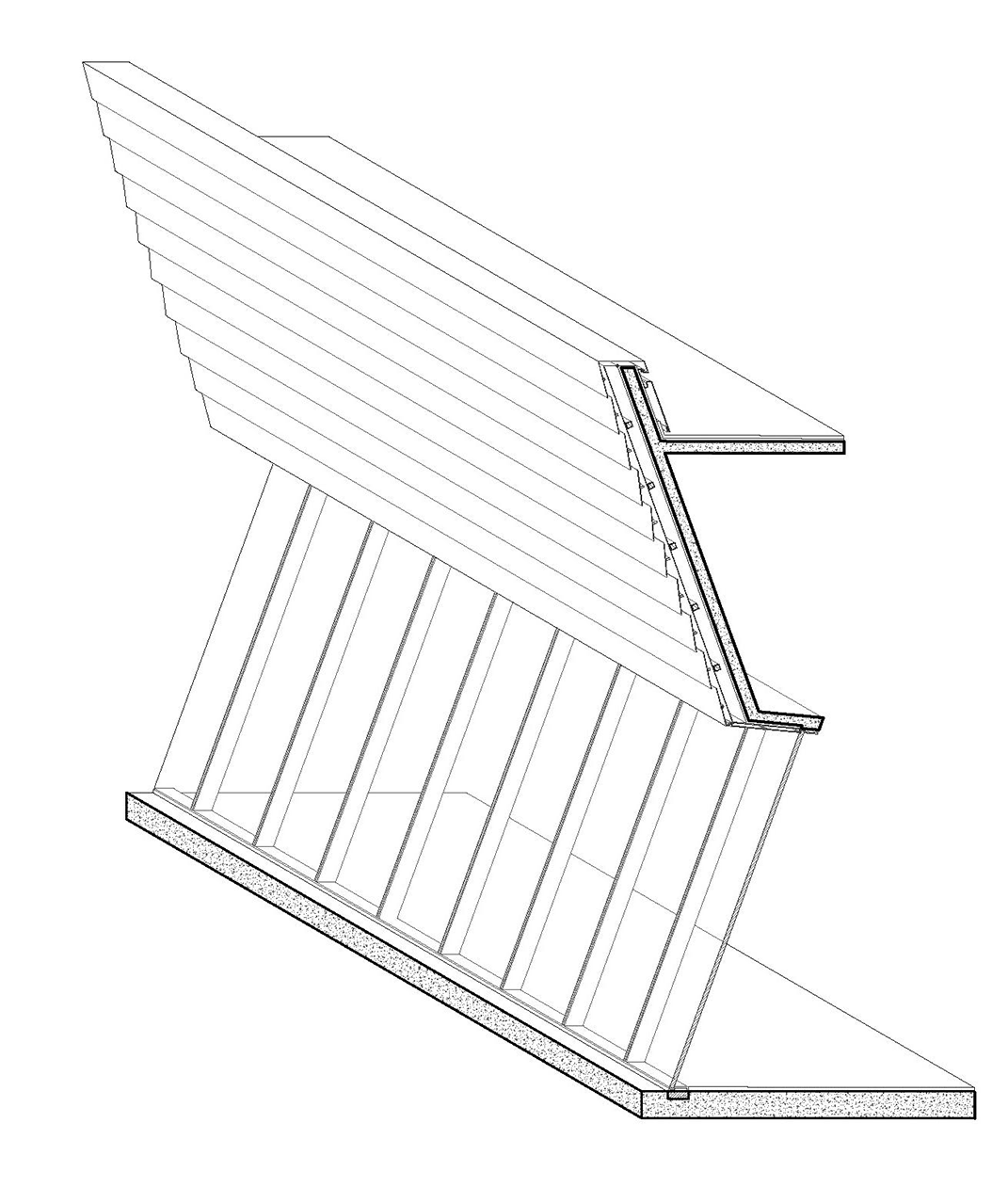
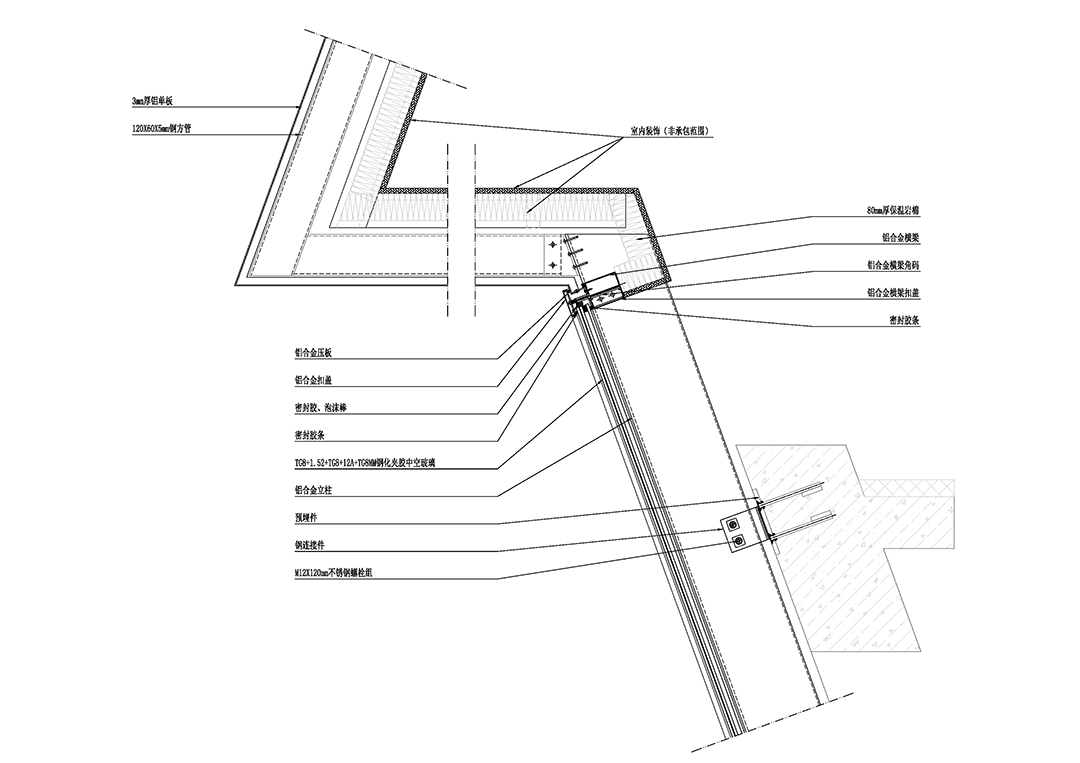
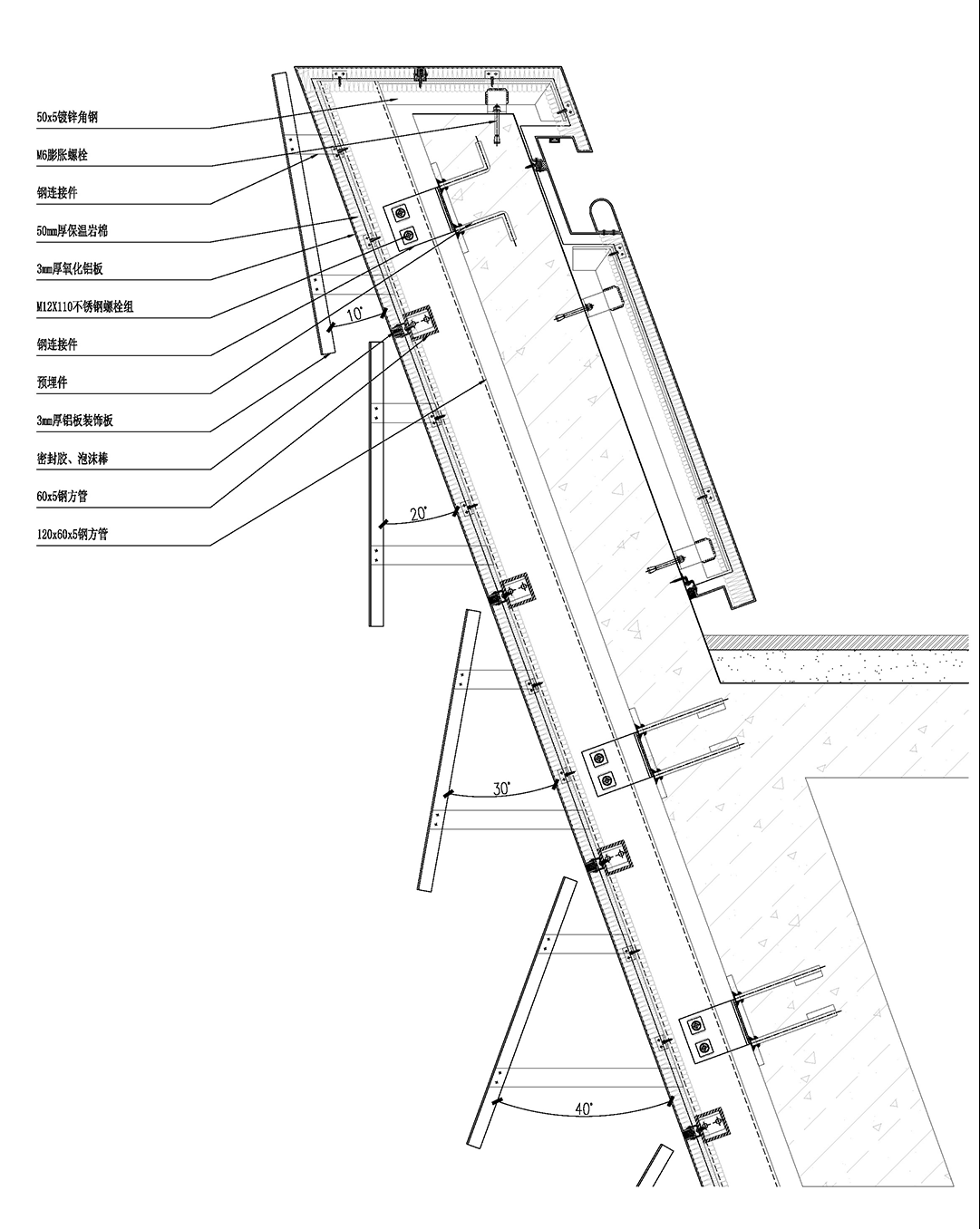
完整项目信息
项目名称:友邦云艺术中心
项目所在地:浙江省嘉兴百步开发区
建筑室内设计单位:CROX阔合
设计团队:林琮然、陈冠宇 、Saunaam Yip、Darcy、周天野、朱珈仪、杨维玲、林森、Yusi、李本涛、杨维玲、万若珈、顾博闻、段美晨、莫抒琳 、周晨媛 、朱飔晗、黄培耿、陈灿
业主单位:友邦集成吊顶有限公司
设计周期:2014年-2019年8月
完成时间:2024年2月
建筑面积:10300平方米
施工图设计合作单位:温州设计院
幕墙设计单位:旭密林幕墙技术公司
桥梁设计单位:浙江恒欣建筑设计股份有限公司
照明设计:Dark Light lighting Design
建筑材料:铝板、玻璃、水磨石子、木板地面
摄影:胡艺怀
影像:孙中川
本文由CROX阔合授权有方发布。欢迎转发,禁止以有方编辑版本转载。
投稿邮箱:media@archiposition.com
上一篇:腾讯前海总部公寓建筑群竞赛方案——XY社区|GN栖城设计
下一篇:动态的同构:日照市科技馆 / 中国院本土设计研究中心